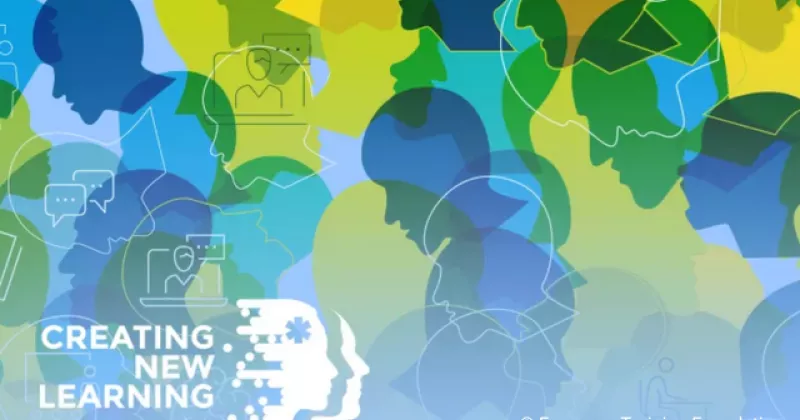Digital Educational Counselling Austria - Highlights
Authors: Barbara Oberwasserlechner and Karin Okonkwo-Klampfer
Translated from German by EPALE Austria
Context of Online-Educational Counselling Austria
Online educational counselling already has a long tradition in Austria, as it has been offered text-based in the form of e-mail and scheduled chat via a counselling platform for twelve years. Initially developed on a regional basis, the service was gradually expanded throughout Austria from 2013 onwards.
In parallel, other digital counselling formats, such as video-based counselling, have also been offered in the Austrian regional networks of federal provinces. The Covid pandemic accelerated the diversification of digital counselling, such as in group counselling. The resulting range of services is an enrichment for clients, but also poses challenges for the organisations offering them: What does a client-oriented blended guidance concept look like? Will funding be adequately increased? How does this counselling diversity affect the counsellors' work organisation? What competences do counsellors need to acquire?
This text briefly summarises the experiences in the project Online Educational Counselling Austria and in the pilot project on messenger counselling and sheds light on the interactions between the counselling context and the counselling relationship.
Online Educational Counselling Austria is one of several sub-projects of Educational Counselling Austria, albeit the only supra-regional counselling service. The framework conditions are complex: Educational Counselling Austria has a decentralised structure and is organised in each of the provinces as a counselling network with its own project funding proposal. Online Educational Counselling Austria and its further development takes place cooperatively, is centrally coordinated and is project-technically part of a project funding proposal in which various supra-regional projects are bundled.
Online counselling is carried out by counsellors of the provincial networks and is thus a service of the provincial networks. On the other hand, the purchase and ongoing adaptation of the counselling software including first level support, the operation of the central entry portal for clients, agreements on the implementation of the offer as well as quality assurance and further development are central services of the supraregional project, which is coordinated by the Viennese Adult Education Centres (Wiener Volkshochschulen).
All projects are funded by the Federal Ministry of Education, Science and Research and the European Social Fund. The individual guidance networks have different financial resources, as co-financing by the respective federal province is required.
Project Online Educational Counselling Austria
Clients can reach the Online Educational Counselling Service via the website https://www.bildungsberatung-online.at. In order to use the text-based e-mail or scheduled chat counselling, they have to choose a user name and a password and can voluntarily provide counselling-relevant information about themselves and their counselling needs. Counsellors provide counselling via https://www.beranet.de; the information provided in advance enables them to prepare for counselling in a particularly data-secure counselling space. Clients, however, now often find this access to be high-threshold.
Online Educational Counselling Austria has been particularly successful in ensuring Austria-wide standards. Through the joint reflection of practice in supervisions, on team days and in webinars, an open learning space has emerged in which a common understanding of guidance has been developed.
Pilot Project Messenger Counselling in the Regional Network Vienna
Messenger counselling is particularly low-threshold and enables clients to receive counselling via their everyday communication channels. In autumn 2021, the Vienna Adult Education Centres, as a network partner of educational guidance in Vienna[1], conducted a two-month pilot phase on messenger guidance. The website chat and two messaging apps (WhatsApp and Facebook Messenger) were tested. The website chat was discontinued after the pilot phase for reasons of resources. Counsellors answer all enquiries in the message centre of the Userlike software, regardless of the messenger channel used.
The choice of channels for the implementation depends on the user behaviour of the desired target groups as well as the time and financial resources of the counselling institutions. The messenger counselling is intended to address people with few technical or financial resources, but not to push them to use a channel due to a lack of alternatives.
In the two-month pilot phase in autumn 2021, the messenger counsellors served 80 clients. The majority of the requests came via WhatsApp. The combination of online outreach counselling and messenger counselling has led to increased demand.
Communication via the Userlike software enables the use of the different messenger channels, including WhatsApp, in compliance with data protection regulations. For this purpose, the WhatsApp Business API is used, an interface that was created especially for companies. In the settings of one's own Userlike company account, there is also the option to restrict the collection of personal data.
Effect of context on the counselling relationship
A central prerequisite for a safe, confidential counselling space is clarity about the counselling context. Knowing the people involved, knowing the framework conditions such as accessibility, possible contents of the counselling and its limits contribute significantly to a successful counselling relationship for clients, but also for counsellors.
It is important for clients to know who is counselling them. In messenger counselling, the name of the counsellor is not visible. Counsellors must therefore introduce themselves briefly. An attractive option is to send an audio post that takes up little space and can be called up again and again by clients, thus losing the disadvantage of the volatility of spoken language.
Clear communication of availability and response times helps to build trust. If counsellors do not react for unknown reasons, this can trigger unpleasant experiences for clients or lead to the termination of counselling.
Furthermore, because of their low-threshold nature, messenger apps invite spontaneous enquiries - such as from the waiting room of a doctor's office or during a break at work. Clients thus remain strongly connected to their current environment, which is unknown to the counsellors, and to their respective roles, such as patient or employee. A yet to be developed methodology for messenger counselling must also take into account the spontaneity and the variable setting in order to be able to optimally use the advantages of the messenger.
Also for counsellors, a lack of assessment of the current context of the clients and their concerns can create uncertainty and reduce their ability to get in touch with clients. Supervision can play an important role in broadening the methodological scope.
Another aspect of context in messenger counselling is the history log of the counselling on the client's device. For the first time, all messages can be arranged in multimedia form on one surface, comparable to an endless scroll, related to each other and read at any time. It has to be explored when which media can be used most optimally with which effect and how they should be designed.
Experience so far shows that messenger counselling works well when the questions are as few and brief as possible and are closely oriented to the request, and information is presented briefly and clearly.
Messenger counselling has proven to be an exciting counselling format with a lot of potential for development, which should be expanded and further developed in exchange with other counselling services.

(C) Pixabay
About the authors:
Barbara Oberwasserlechner is content coordinator of the project Online Educational Counselling Austria. She is an experienced counsellor with various face-to-face and online educational counselling formats. She is currently gaining initial experience with messenger guidance. barbara.oberwasserlechner@vhs.at
Karin Okonkwo-Klampfer is head of the Online Educational Counselling Austria project. She is a project manager with a passion for digitalisation and supports the introduction and use of digital technologies in adult education. karin.okonkwo-klampfer@vhs.at
www.bildungsberatung-online.at, www.bildungsberatung-wien.at
This article is based on a presentation given by the authors at the Austrian Euroguidance Conference 2022.
[1] Funded by the European Social Fund, the Federal Ministry of Education, Science and Research and the Vienna Employee Promotion Fund (WAFF).





